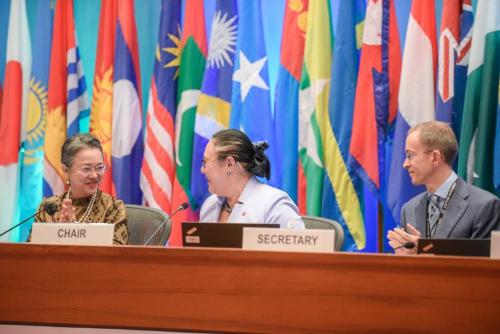
Bangkok - 19 May 2023
https://www.unescap.org/news/asia-pacific-countries-adopt-10-un-resoluti...
“The global climate fight will be won or lost in this crucial decade; in this context, the resolution demonstrates the commitment by countries in the region to take faster and bolder climate action to ensure that their climate goals are met,” said Armida Salsiah Alisjahbana, United Nations Under-Secretary-General and Executive Secretary of ESCAP at the closing.
The resolution further recommends countries to promote clean energy technologies, regional power system connectivity, low-emission mobility, early warning systems and strengthened use of climate change-related statistics as part of crucial mitigation and adaptation strategies.
Nine other resolutions aimed at strengthening regional action and partnerships towards achieving the 2030 Agenda for Sustainable Development were also adopted at the 79th session of the Economic and Social Commission for Asia and the Pacific (ESCAP), which was held in Bangkok from 15 to 19 May and drew over 1,000 representatives from governments and stakeholder groups.
Among others, the resolutions underscored commitments towards environmental protection; mitigating and minimizing the consequences of disasters in the water basin of the Aral Sea; supporting countries in special situations; promoting digital cooperation and inclusion; advancing the use of space applications; promoting disability-inclusive development; better understanding of the linkages between climate and ocean; and sustainable urban development.
Recognizing the transformative role of cities at the frontline of almost all global development and climate agendas, countries emphasized the positive contributions of national, subnational and local governments. They encouraged stakeholders to work together closely to develop impactful urban initiatives in implementing the 2030 Agenda.
Several of the resolutions at this year’s Commission also acknowledged the unique challenges of least developed countries, landlocked developing countries and small island developing States in the region, who find themselves increasingly vulnerable amidst the impacts of climate change, geopolitical tensions, economic headwinds and the COVID-19 pandemic.
A report released to coincide with the meeting revealed that despite the clear benefits of connectivity in transport, energy and ICT, these countries in special situations lag far behind what other countries in the region have managed to achieve.
On the sidelines of the 79th Commission session, ESCAP and the Pacific Islands Forum Secretariat signed a memorandum of understanding to complement each other’s strategic work on the SDGs, climate action and resilient development, social inclusion and equity, and regional economic and trade cooperation opportunities in the Pacific.
For further information on CS79: https://www.unescap.org/events/commission79
Watch the CS79 proceedings: www.youtube.com/unescap
For CS79 multimedia assets: https://trello.com/b/05hTKOby/cs79










Add new comment